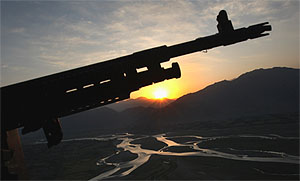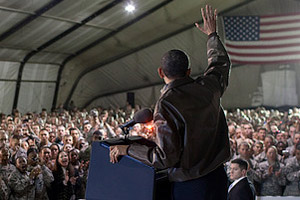
<a href="http://www.flickr.com/photos/soldiersmediacenter/3379472935/">US Army Sgt. Robert Newman</a>/Flickr
Richard Holbrooke’s last words, spoken to his Pakistani surgeon before he was sedated for surgery a week ago, were “You’ve got to stop this war in Afghanistan.” The White House has since taken pains to tell us that he was speaking in jest, and perhaps that’s just as well. Because recent news suggests that the war is neither going to end nor come to anything resembling a successful conclusion anytime soon.
Start with Afghanistan’s president, Hamid Karzai. His attitude toward the United States, which has been all but clinically bipolar for quite some time, turned even more heated than usual recently when he met with several American officials to discuss the fate of private security firms. The Washington Post reports what happened:
As he spoke, he grew agitated, then enraged. He told them that he now has three “main enemies”—the Taliban, the United States and the international community. “If I had to choose sides today, I’d choose the Taliban,” he fumed. After a few more parting shots, he got up and walked out of the wood-paneled room.
It is practically an axiom of counterinsurgency that success depends (among other things) on the active help of an effective and sympathetic government. It’s become increasingly clear that we no longer have that in Afghanistan, if we ever did. The Karzai government is almost stunningly corrupt, it has effective control over only a fraction of the territory of Afghanistan, and Karzai himself in recent months has repeatedly gone into  rages both public and private against the American occupation. It’s no longer possible even for paid optimists to pretend that we have his support in any but the most technical sense.
rages both public and private against the American occupation. It’s no longer possible even for paid optimists to pretend that we have his support in any but the most technical sense.
Then there’s the US intelligence community, which recently reported to Congress that the Afghanistan war cannot be won unless Pakistan gets serious about rooting out Taliban militants on its side of the border. But the report goes on to say the Pakistani government and military “are not willing to do that,” according to an official quoted by AP. “The document says Pakistan’s government pays lip service to cooperating with US efforts against the militants, and still secretly backs the Taliban as a way of hedging its bets in order to influence Afghanistan after a US departure from the region.”
Military commanders dispute the intelligence analysis, but their protests are hard to take seriously. Pakistan has been supporting the Taliban for over a decade, they barely even pretend these days to prevent them from crossing the border at will, and they know perfectly well there’s no real leverage we can bring to bear to change their behavior. As Andrew Exum put it in an otherwise positive report after a recent visit to Afghanistan, “I do not see a coherent or otherwise effective strategy for dealing with the sanctuaries in Pakistan. I do not see it anywhere in the US government or within NATO, whose writ only extends to the borders of Afghanistan anyway.”
Finally, support for the war in the US has fallen off a cliff. ABC News reports: “Public dissatisfaction with the war, now the nation’s longest, has spiked by 7 points just since July. Given its costs vs. its benefits, only 34 percent in the latest ABC News/Washington Post poll say the war’s been worth fighting, down by 9 points to a new low.”
The argument for optimism is that NATO forces have made substantial tactical gains in the past year: intelligence gathering is better, local support is stronger, security is improving, and the Taliban is in retreat. You can read a pretty good version of this case here, from Peter Mansoor and Max Boot. But tactical improvements only get you just so far. Our big long-term problems—lack of central government support, lack of Pakistani support, and lack of American public support—suggest pretty strongly that the war in Afghanistan isn’t winnable in any ordinary sense of the word. It’s hard to say if this has sunk in at the White House, which released its latest review of Afghanistan on Thursday and apparently plans to stay the course. Sort of. Troop withdrawals might begin next year, but only in token numbers. The new deadline is 2014, and even that’s vague.
As Fred Kaplan says in his informative take on both the White House review and the thorny politics of the AfPak region, “Nothing about this war gets any easier.” At this point, it’s difficult to conclude that further US fighting in Afghanistan can do anything more than delay the inevitable—and possibly make it worse when it finally comes to pass. Without active support from Kabul, Islamabad, and the American taxpayer, tactical gains can never be more than limited and temporary. As bad as an American withdrawal from Afghanistan would be, our continued presence in the face of an impossible situation only makes it worse. A year ago Afghanistan still couldn’t fairly be called anyone’s Vietnam. Today, it’s Obama’s.

















